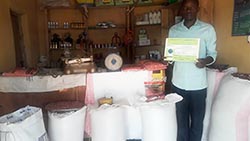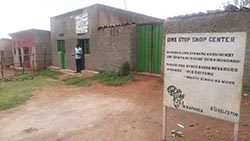Speciose Kantengwa chose this article for the following reason: It illustrates how knowledge can be a starting point for change It shows sustainability of N2Africa approach: lead farmers in the dissemination of BNF technologies, a lead farmer converted into an agro dealer selling agriculture inputs and providing technical messages to community members. First appeared in Podcaster 45, April-May 2017.
“Before N2Africa started working with us in TWIZERANE farmer’s association, we used to grow crops in a traditional way, no use of improved crop varieties, or fertilizer. The crop yield was always low because of ignorance. After interacting with N2Africa technologies in 2010, I saw the difference between improved technologies and the traditional method of cropping, especially inoculation of soyabean coupled with the use of DAP and planting in row, which significantly increased our production of bush bean and soyabean crops”. This was remarked by Mr. Celestine who is part of a farmer group of 25 farmers called TWIZERANE. TWIZERANE started to work with N2Africa in 2010, when they hosted two agronomic trials showcasing varieties and other inputs. Until this time, Celestine’s group was only able to grow crops using traditional methods. The scope of activities they would engage in was limited as a result of knowledge deficits.
|
Mr. Celestine was selected by his group members to become the master farmer (lead farmer) and was trained by the N2Africa project to assist other farmers in BNF technologies. This included participation in study tours organized by the project. “I attended several training sessions organized by N2Africa around BNF, including a study tour to Western Kenya to visit farmers growing soyabean for collective marketing. From there, I changed my perception of agriculture and moved away from subsistence to professional agriculture. My group TWIZERANE started a community based seed production activity. I started selling bean and soyabean seeds of new improved varieties-SB 24 for soyabeans and RWR2245 for bush beans (produced by the group) to other farmers. As there was no input selling store in our community (Musenyi), I introduced mineral fertilizer (DAP) and pesticides, because farmers were asking for them and advice on how to use them. Since I was trained on agronomic practices, I was capable to help them”. Celestine’s aim was to become a certified agro-dealer in his sector of Musenyi, providing access to inputs to his fellow farmers. As a lead farmer, he made it his responsibility to acquire the certification for input distribution. This was consciously set as a goal as it was a major hindrance to the use of any of the inputs introduced in the sector to farmers. To achieve these targets, Celestine filled an application with the Ministry of Agriculture (MINAGRO) in 2014 to obtain a certificate of permission to sell inputs. Relying on the knowledge acquired from working with N2Africa, he also took part in a training organized by the National Agro Dealers Network to become an authorized Agro Dealer. With this certification, Celestine could now widen his scope of work and even had bargaining power with financial institutions. He applied for and received a loan from SACCO of 1 million RwF and with his savings of 1 million RwF, he started a real business. His bag (50 kg) of DAP increased to 5 bags (250 kg) of DAP and 2 bags (100 kg) of Urea per season. In 2016, he sold 11 tons of fertilizers (DAP and Urea) and seeds (2 tons of soyabean, 1 ton of maize and 1.5 ton of bean). This season, he is expecting to reach 15 tons. Celestine also sells soyabean inoculants, PICS bags, vegetable seeds, agriculture tools, and pesticides. This initiative has provided access to above inputs and its timeliness on seasonal basis to farmers in Musenyi sector. A total of about six thousand (6000) farmers are served on seasonal basis. “In addition to becoming an agro dealer, the training on linking farmers to market organized in 2012 by N2Africa, I learnt how to calculate interest/benefits”. From there, I started selling my produce to market at a good price. The group TWIZERANE used to produce for home consumption, share what we produce. Illustration: we used to produce 80 -100 kg of bean per 0.2 hectares (terrace) and share it among the 25 members. With improved technologies introduced by N2Africa, we moved from 100 to 400 kg for same land area of bean produced. On learning, “I will advise other Agro Dealers to acquire technical knowledge on fertilizers and agronomic practices in order to advise customers on how to use inputs they are buying, extension messages to accompany inputs bought”. He also iterated that the awareness created in the community through the exposure with N2Africa technologies made sales of fertilizers and seeds more demand driven, this made sales of inputs easy. Mr Celestine: “My next step will be to open another shop in the next cell (community) to help farmers from that village because they walk long distance to come to my current shop. Buy a motorbike to facilitate moving around to provide technical advice to other farmers. Extend the current shop to have a separate space for storing fertilizers and seeds and add other items like safety equipment. Also collect soyabean grain from farmers and sell to Soyco Mt Meru Company”.
|
Story by Mr. Celestine, Agro Dealer in Musenyi Community in Rwanda


